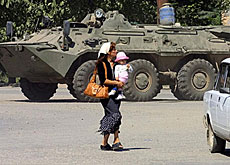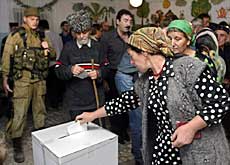Swiss battle on to bring peace to Chechnya

After more than a decade of conflict in Chechnya, Swiss-run aid organisations are among the few still active in the North Caucasus republic.
The Bern-based research institute, Swisspeace, on Tuesday devoted its annual conference to assessing Swiss efforts to bring peace to the conflict-ridden region.
The International Committee of the Red Cross (ICRC) – headquartered in Geneva – has a large team based in the region: 360 local employees with a budget of SFr34 million ($26 million) for 2006.
Daniel Schriber, deputy head of Eastern European operations, explained that the main deterrent to carrying out humanitarian work on the ground was the lack of security.
“The risk of kidnapping is high and since 1999 ICRC staff have been using armed escorts throughout the Caucasus,” he said.
The decisive moment came on December 17, 1996, when six Red Cross workers were killed in a Chechen hospital in Novye Atagi.
Remote control approach
Since then, the ICRC has employed a “remote control approach”, said Schriber. This way of working has since been replicated in many other places, most notably Iraq, where conditions on the ground remain extremely dangerous.
The ICRC works from an office in Nalchik, capital of the nearby Kabardino-Balkar Republic. Pulling out of Chechnya was never an option, said Schriber.
“To stop our presence would be to punish the victims of this conflict. Many feel that they have been forgotten by the international community.”
One of the recent low points of the organisation’s involvement to ease life for civilians came in September last year when the Russian authorities stopped the ICRC from visiting detainees. Moscow was not willing to accept the ICRC’s conditions for such visits, and negotiations on new visitation rights are currently underway.
However, the organisation retains what it calls “residual protection activities”, explained Schriber.
Prisoners
This includes the exchange of messages between prisoners and their families and paying for relatives of detainees to visit prisoners in detention centres located in other Russian towns.
Schriber added that the organisation was directly assisting 76,000 people in Chechnya, primarily by distributing non-food items to the most vulnerable households, including tarpaulins, kitchen sets, clothing and school kits for children.
The ICRC’s priorities in Chechnya for next year include supporting and rebuilding the healthcare system, and improving water supplies and sanitation.
In addition, the organisation envisages financing 1,000 micro-economic projects.
“After ten years of direct assistance, some people are ready to start their own business, such as owning a few cows,” said Schriber.
Neutral
The Swiss government also supports peace-building activities in the republic – on Tuesday, the foreign ministry announced a new pilot project aimed at protecting civilians from kidnapping.
For the Chechens themselves, the Swiss are ideal partners because they are perceived as willing to stay for the long haul.
“Switzerland has a policy of patience – it observes and analyses,” said Geneva-based Roustam Semeev, president of the Association for Chechens in Europe. “There are serious ideas and ambitions on the part of the Swiss government regarding the Caucasus area.”
He added that the Swiss were therefore well placed to help peace efforts, but admitted that there was little prospect of an end to the conflict in the foreseeable future.
“The Chechen conflict has gone too far. It has to be controlled… The killing of Chechens has to stop and it requires the intervention of a third party to stop the war before the dialogue between the Russian government and the Chechens fighting for independence can begin.”
Andreas Gross, a Swiss parliamentarian who is the Council of Europe’s rapporteur on Chechnya, said neutrality was the key to Switzerland’s acceptance in Chechnya.
“The Swiss… are ready to speak up when others [don’t], they are not afraid, nor biased and they are ready to listen to different sides,” Gross said.
He added that the main problem in Chechnya was that the Russian authorities had no strategy on how to solve the conflict.
“Former totalitarian cultures are not used to talking to people they don’t like.”
swissinfo, Faryal Mirza
Chechnya declared independence from Russia in 1991. War broke out three years later, when Moscow deployed troops to regain control of the republic.
This ended in 1996 with a defeat for the Russian forces.
In 1997 Chechen rebel leader Aslan Maskhadov was elected president in elections recognised as fair by 200 international observers.
In 1999 the Russian prime minister, Vladimir Putin, sent troops back after Chechen militants attempted to start an armed uprising in neighbouring Dagestan.
Some 75,000 Russians and Chechens are estimated to have been killed during the conflict.
Swisspeace is a research institute which examines the causes of conflict and develops strategies to restore peace.
The Swiss-run ICRC, based in Geneva, works mainly to protect victims of conflict and disaster by providing humanitarian assistance and conducting prisoner of war visits.

In compliance with the JTI standards
More: SWI swissinfo.ch certified by the Journalism Trust Initiative


You can find an overview of ongoing debates with our journalists here . Please join us!
If you want to start a conversation about a topic raised in this article or want to report factual errors, email us at english@swissinfo.ch.